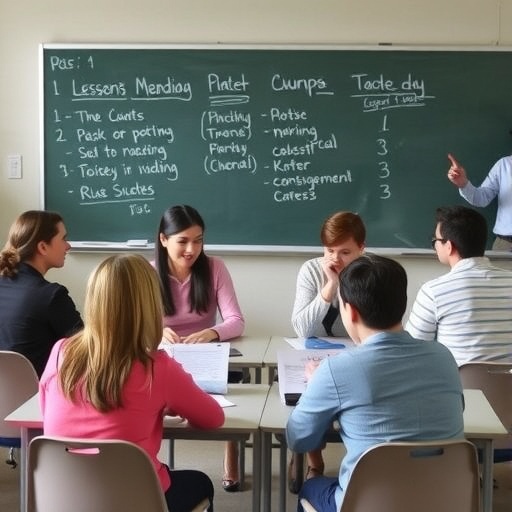In the realm of education, the continuous evolution of teaching methodologies is paramount for fostering effective learning environments, particularly in the field of language acquisition. The recent research led by İleritürk and Kıncal emphasizes the significance of developing specific proficiencies among English language teachers through the innovative approach known as lesson study. This method not only enhances teaching skills but also directly impacts student outcomes. As language learning becomes increasingly critical in our global society, understanding how to effectively enhance teacher capabilities is essential.
The notion of lesson study is rooted in collaborative professional development. This approach allows teachers to come together to collaboratively plan, observe, and discuss lessons in a structured manner. Through this method, teachers can identify effective strategies, address challenges, and refine their teaching techniques. The current study explores how this collaborative framework encourages English language teachers to deepen their understanding of pedagogy while simultaneously improving their instructional proficiencies.
By focusing on the special field proficiencies of teachers, the research highlights a tailored aspect of teacher development. Special field proficiencies refer to the skills and knowledge required for teaching English as a foreign language specifically, which includes understanding diverse student needs, mastering effective assessment techniques, and integrating cultural context into lessons. The study underscores how this enhanced focus on specialized skills can lead to a more nuanced approach to teacher education.
One of the critical conclusions drawn from the research is the identification of various strategies that emerged through the lesson study process. For instance, teachers reported increased confidence in their instructional abilities as they shared insights and feedback with their peers. This aspect of collaborative learning is crucial, as it fosters an environment where educators feel supported and empowered to experiment with innovative teaching practices. The study provides compelling evidence that engagement with colleagues during lesson study can lead to significant professional growth and development.
Furthermore, the research reveals that teachers who participate in lesson studies often experience a shift in their understanding of teaching itself. Rather than viewing teaching as a solitary endeavor, participants learn to see it as a communal activity that benefits from open dialogue and shared experiences. This transformation reinforces the idea that effective teaching is not just about delivering content but also about engaging with students in meaningful ways that promote language acquisition.
Through lesson study, teachers also become more adept at incorporating technology and multimedia resources into their lessons. As English language teaching evolves, the necessity for integrating digital tools aligns with the needs of contemporary learners. Participants in the study reported a heightened ability to integrate technology into their teaching, which is particularly relevant in today’s digital age. This skill not only enhances lesson engagement but also prepares students for a world increasingly dominated by digital communication.
In terms of assessment proficiency, the findings indicate that teachers developed a better understanding of how to evaluate student progress effectively. During the lesson study sessions, educators collaborated on creating assessment tools that provided meaningful feedback rather than mere numerical grades. This shift in assessment philosophy aligns with current trends in education that prioritize formative assessments over summative ones. The ability to gauge student understanding through ongoing evaluation is vital for promoting engaged learning.
Additionally, the significance of culturally responsive teaching was another focal point of the research. Teachers participating in the study recognized the importance of acknowledging students’ diverse backgrounds and incorporating relevant cultural elements into their lessons. This aspect of teaching not only validates students’ identities but also enriches the language learning experience. By reflecting on their practices within lesson study frameworks, teachers are better equipped to create inclusive and relatable content for their students.
The impact of the lesson study approach extends beyond the individual teachers involved; it also contributes to the broader school community. When educators engage in collaborative practices, they foster a culture of respect and shared responsibility among colleagues. This collective professional identity can lead to a more cohesive educational environment where students benefit from seeing their teachers as lifelong learners dedicated to personal and professional growth.
In practical terms, implementing lesson study within teacher training programs presents both challenges and opportunities. While there may be logistical hurdles, such as scheduling and resource allocation, the potential benefits for teacher proficiency encourage a deeper examination of these barriers. Education institutions must consider innovative ways to incorporate collaborative frameworks into their curricula, investing in the professional development of educators as a priority.
Ultimately, this research by İleritürk and Kıncal not only sheds light on an effective approach to enhancing English language teacher proficiencies but also serves as a call to action for educational policymakers. By recognizing the value of collaborative professional development, stakeholders can advocate for systemic changes that prioritize teacher growing practices. This shift has the potential to create a more dynamic and effective language teaching landscape, ultimately benefiting students and their language acquisition journeys.
In conclusion, as the needs of students and the demands of language instruction evolve, educators must continuously adapt and refine their teaching practices. The findings from this study offer vital insights into how lesson study can serve as a powerful tool for teacher development, creating a ripple effect that enhances the entire educational experience. The commitment to fostering an environment of collaboration, innovation, and professional growth will play a pivotal role in shaping the future of language education.
Subject of Research: Development of English language teacher proficiencies through lesson study
Article Title: Developing English language teacher special field proficiencies through lesson study
Article References:
İleritürk, D., Kıncal, R.Y. Developing English language teacher special field proficiencies through lesson study.
Discov Educ 4, 428 (2025). https://doi.org/10.1007/s44217-025-00716-y
Image Credits: AI Generated
DOI: 10.1007/s44217-025-00716-y
Keywords: English language teacher development, lesson study, professional development, collaborative learning, culturally responsive teaching, educational methodology.




